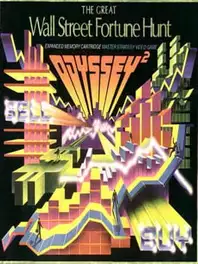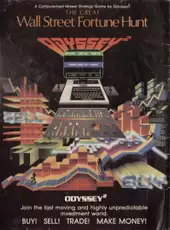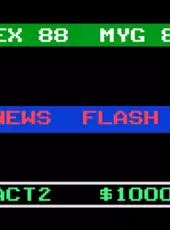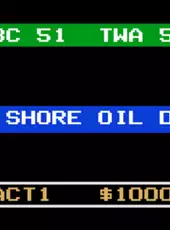
Great Wall Street Fortune Hunt - Notizie
Generi:
Strategy, Simulator
Piattaforma:
Odyssey 2 / Videopac G7000
The Great Wall Street Fortune Hunt is another game in the Master Strategy Series, a series of part console, part board games on the Odyssey².
This is a stock exchange simulator. One or two players (or groups, if more than 2 people are playing) take the role of investors (or investment syndicates) trying to anticipate investment fluctuations to take advantage of buying and selling opportunities which occurs during the game.
The main screen is divided in three sections. The upper section displays the investment choices and prices per share scrolling from right to left. The middle section displays news flashes related to the market and the lower section displays each player's investment portfolio and capital. A grey bar chart to the right displays the overall market performance during each quarter of a year.
Each investor starts with $100,000 and can enter a maximum of seven investments into the computer. The investments are bought using the keyboard by entering the letters representing it (IBM, for instance) and the number of shares wanted. The shares can be sold in lots of 100. All investments entered must be sold at the end of each year (four quarters, each quarter taking about 5 minutes of real time). The computer will signal the end of each quarter. The winner is the investor accumulating the greatest net worth after 5 years.
The game can be played in four levels of progressively increased complexity:
Straight Investment Transactions
Straight Investment Transactions & Treasury Bills
Straight Investment Transactions & Treasury Bills & Buying on Margin
Straight Investment Transactions & Treasury Bills & Buying on Margin & Stock Options
The gameboard is used to keep track of information dealt with off-screen. It is divided in 4 sections: investment positions, T-Bill market, time frame indicator and prime rate indicator.
Each investor receives a set of numbered share/margin tokens to be placed in the share section of the gameboard for every straight transaction done. There are 30 different investments available and each investment has a different sensitivity to changing national and international conditions in three areas as shown in the gameboard: Gross National Product, Prime Interest Rate and Political Instability. The news flashes presented in the screen will affect the investments according to there three indicators.
The time frame indicator is used to keep track of which quarter the game is currently on.
The T-Bill market and Prime Interest Rate parts of the gameboard are only used in level 2 games or higher. The Prime Interest Rate is the interest banks quote as charging their best corporate customers. It is directly related to the interest rate on Treasury Bills. The prime rate will be reported by the news bulletins on the screen and must be marked with the appropriate tokens on the gameboard.
The level 3 adds the option of buying stocks on margin, i.e., with money borrowed from the broker. The computer only keeps track of investments bought in cash, so this kind of transaction must be tracked with the help of a proper token in the gameboard.
The level 4 adds option trades to the game. Options give the investor the right, but not the obligation, to buy or sell securities at current prices at the beginning of the following quarter. It is basically a bet about the rise or fall of a specific security price.
Besides the gameboard, each player has his/her own investment record pad to better keep track of his/her transactions.
This is a stock exchange simulator. One or two players (or groups, if more than 2 people are playing) take the role of investors (or investment syndicates) trying to anticipate investment fluctuations to take advantage of buying and selling opportunities which occurs during the game.
The main screen is divided in three sections. The upper section displays the investment choices and prices per share scrolling from right to left. The middle section displays news flashes related to the market and the lower section displays each player's investment portfolio and capital. A grey bar chart to the right displays the overall market performance during each quarter of a year.
Each investor starts with $100,000 and can enter a maximum of seven investments into the computer. The investments are bought using the keyboard by entering the letters representing it (IBM, for instance) and the number of shares wanted. The shares can be sold in lots of 100. All investments entered must be sold at the end of each year (four quarters, each quarter taking about 5 minutes of real time). The computer will signal the end of each quarter. The winner is the investor accumulating the greatest net worth after 5 years.
The game can be played in four levels of progressively increased complexity:
Straight Investment Transactions
Straight Investment Transactions & Treasury Bills
Straight Investment Transactions & Treasury Bills & Buying on Margin
Straight Investment Transactions & Treasury Bills & Buying on Margin & Stock Options
The gameboard is used to keep track of information dealt with off-screen. It is divided in 4 sections: investment positions, T-Bill market, time frame indicator and prime rate indicator.
Each investor receives a set of numbered share/margin tokens to be placed in the share section of the gameboard for every straight transaction done. There are 30 different investments available and each investment has a different sensitivity to changing national and international conditions in three areas as shown in the gameboard: Gross National Product, Prime Interest Rate and Political Instability. The news flashes presented in the screen will affect the investments according to there three indicators.
The time frame indicator is used to keep track of which quarter the game is currently on.
The T-Bill market and Prime Interest Rate parts of the gameboard are only used in level 2 games or higher. The Prime Interest Rate is the interest banks quote as charging their best corporate customers. It is directly related to the interest rate on Treasury Bills. The prime rate will be reported by the news bulletins on the screen and must be marked with the appropriate tokens on the gameboard.
The level 3 adds the option of buying stocks on margin, i.e., with money borrowed from the broker. The computer only keeps track of investments bought in cash, so this kind of transaction must be tracked with the help of a proper token in the gameboard.
The level 4 adds option trades to the game. Options give the investor the right, but not the obligation, to buy or sell securities at current prices at the beginning of the following quarter. It is basically a bet about the rise or fall of a specific security price.
Besides the gameboard, each player has his/her own investment record pad to better keep track of his/her transactions.
Rilasciato il 31/12/1982
Sintesi:
THE GREAT WALL STREET FORTUNE HUNT is an authentic computerized model of the real investment world. The opportunities for investment in the game represent the thousands of alternatives available on the various exchanges.You'll find conservative blue chips like IBM (International Business Machines Corporation) and high risk high flyers like WOW (Wildcat Oil Western). You'll find the fast food industry represented by McDonald's Corporation and high technology manufacturers represented by Texas Instruments.
Each of the companies available for investment not only represents itself but other similar companies as well. Therefore the Standard Oil Company (Indiana) also represents Shell, Mobil, Arco and the other large petroleum companies.
Each of the investments has a different sensitivity to the news flashes which come across the TV screen. For example - some investments will go up at a time of world crisis and others will go down. The inherent sensitivity of each investment to the various categories of news is graphically displayed on the gameboard.
Your ultimate objective is to anticipate investment fluctuations swiftly enough to take full advantage of the many buying and selling opportunities which will occur in a different way every time you play.
The rules of The Great Wall Street Fortune Hunt are designed to replicate real life as closely as possible. You can play it at four levels. It is highly recommended that you feel thoroughly comfortable at one level before incorporating the next level as part of the game. Have fun! Make money!!!
×
![]()




